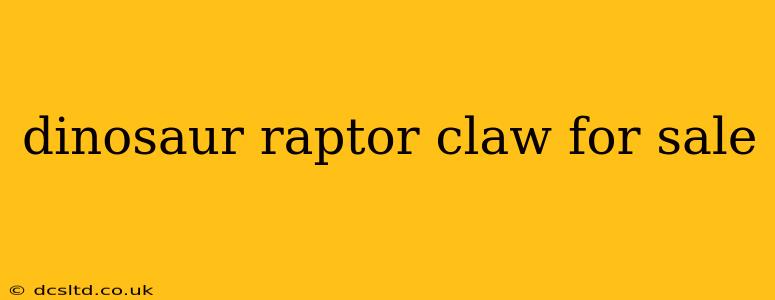The allure of owning a piece of prehistory is undeniable, and few fossils capture the imagination quite like a dinosaur raptor claw. These formidable relics offer a tangible connection to a world millions of years gone, sparking curiosity and wonder. However, the market for dinosaur fossils, including raptor claws, is complex, demanding careful consideration before making a purchase. This guide will equip you with the knowledge to navigate this fascinating yet sometimes treacherous terrain.
What Makes a Raptor Claw Valuable?
Several factors contribute to the value of a dinosaur raptor claw:
-
Species: Claws from iconic genera like Velociraptor or Deinonychus command significantly higher prices than those from less-known species. Rarity plays a crucial role here.
-
Completeness and Condition: A well-preserved, complete claw is far more valuable than a fragmented or damaged one. The degree of mineralization and the presence of original bone significantly impact value.
-
Provenance: Knowing the precise geological location and formation where the claw was discovered is critical. Reputable sellers provide detailed provenance information, including permits and excavation records. This transparency helps establish authenticity and legal acquisition.
-
Preparation: The skill and care taken in preparing the fossil (cleaning, stabilizing, and potentially reconstructing missing parts) directly impacts its aesthetic appeal and value. Poorly prepared claws may be less valuable, even if they are otherwise complete.
-
Size and Shape: Larger and more complete claws generally fetch higher prices. Unique features, such as unusual curvature or size variations, can also enhance value.
How Can I Identify a Genuine Raptor Claw?
The market for dinosaur fossils, unfortunately, includes forgeries. Therefore, verifying authenticity is paramount. Here's what to consider:
-
Documentation: Demand comprehensive documentation, including photos from the excavation site, permits, and chain of custody records. Reputable dealers will readily provide this.
-
Scientific Examination: For high-value claws, independent scientific examination by a qualified paleontologist is recommended. This expert can assess the fossil's authenticity, age, and species identification.
-
Surface Texture and Mineralization: Genuine fossils exhibit a natural texture and mineralization patterns that are difficult to replicate artificially. Close examination can reveal subtle clues.
-
Seller Reputation: Deal only with reputable dealers with established track records and positive reviews. Avoid suspiciously cheap offers, as these often indicate fraudulent items.
Where Can I Buy a Dinosaur Raptor Claw?
While online marketplaces offer convenience, they also pose risks. It's best to purchase from reputable paleontological suppliers, museums, or auction houses specializing in fossils. These channels often offer better guarantees regarding authenticity and provenance.
What are the Legal Implications of Owning a Dinosaur Raptor Claw?
The legality of owning dinosaur fossils varies widely depending on location and the circumstances of the fossil's acquisition. Some countries have strict laws regulating the import, export, and ownership of fossils. Always ensure you are complying with all relevant laws and regulations. Be wary of fossils sourced from countries with questionable fossil trade practices.
What's the Price Range for a Raptor Claw?
The price of a dinosaur raptor claw is highly variable, depending on the factors discussed above. Small, incomplete claws might be priced in the hundreds of dollars, while exceptional specimens can fetch tens of thousands, or even more.
How Do I Care for My Raptor Claw?
Proper care is essential to preserve your valuable fossil. Avoid excessive handling, keep it in a stable environment away from direct sunlight and extreme temperatures, and avoid using harsh chemicals for cleaning. A well-protected display case is ideal.
Purchasing a dinosaur raptor claw is a significant investment requiring careful consideration. By prioritizing authenticity, provenance, and reputable sellers, you can ensure you acquire a genuine piece of prehistory to cherish for generations. Remember, due diligence is crucial to avoid potential scams and legal issues.
